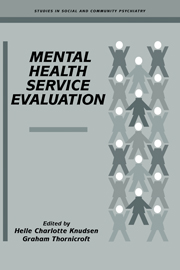Book contents
- Frontmatter
- Contents
- List of contributors
- Foreword
- Preface
- Part I INTRODUCTION
- 1 Deinstitutionalisation: promises, problems and prospects
- 2 Background and goals of evaluative research in community psychiatry
- 3 Research designs for the evaluation of services
- 4 Evaluation and public policy
- Part II COMPREHENSIVE SERVICE EVALUATION PROJECTS
- Part III METHODS: MEASUREMENT, STRATEGIES AND NEW APPROACHES
- Part IV SYSTEM-LEVEL RESEARCH
- Part V PROGRAMME-LEVEL RESEARCH
- Part VI HEALTH ECONOMICS IN MENTAL HEALTH
- Index
4 - Evaluation and public policy
from Part I - INTRODUCTION
Published online by Cambridge University Press: 05 August 2016
- Frontmatter
- Contents
- List of contributors
- Foreword
- Preface
- Part I INTRODUCTION
- 1 Deinstitutionalisation: promises, problems and prospects
- 2 Background and goals of evaluative research in community psychiatry
- 3 Research designs for the evaluation of services
- 4 Evaluation and public policy
- Part II COMPREHENSIVE SERVICE EVALUATION PROJECTS
- Part III METHODS: MEASUREMENT, STRATEGIES AND NEW APPROACHES
- Part IV SYSTEM-LEVEL RESEARCH
- Part V PROGRAMME-LEVEL RESEARCH
- Part VI HEALTH ECONOMICS IN MENTAL HEALTH
- Index
Summary
Introduction
Sound public policy should rest on sound information, and analysis of that information from a policy perspective. A statement of the obvious? Not if you ask policy-makers about the availability of useful information! In fact, determinations of emphases for research and evaluation generally are not made with an eye to the interests and needs of policy-makers. On the contrary, there is some degree of intellectual resistance to examining a research and evaluation agenda according to criteria relating to the needs of public policy. But public resources for mental health depend to a great extent on how well the evaluation and research community interacts with the public policy community.
The aim of this chapter is to describe the information needs and interests of the public policy community, and the importance of the political process in maintaining and enhancing mental health programmes. The role outcome data-reflecting a full array of measures —is discussed. The complexity of organising systems of care in the context of both multiple levels of government and multiple sources of support for services is described, along with several examples of State planning activities. The chapter concludes with a discussion of advocacy in the political process with a focus on mental health consumers’ and families’ interests, and the role of the research and evaluation communities.
Information for policy-makers
To meet the interests and needs of policy-makers, data must be timely, pertinent to the policy-level decisions, and analysed and presented in the context of other relevant information so that their implications are clear both to the policy-makers and to the policymakers’ constituents. The policy-maker will want to understand the extent to which results are replicable, statistically robust, and relevant to the issue at hand. But neither a policy-maker nor a politician is in a position to engage in a detailed analysis of the technical aspects of information used to support a recommended course of action. Hence, communication must be so clear that the facts, and their implications, can be accepted at face value by decision-makers and the constituencies they must respond to. Thus, information should also address the points that advocacy and other groups that impinge on public policy are likely to raise.
- Type
- Chapter
- Information
- Mental Health Service Evaluation , pp. 50 - 64Publisher: Cambridge University PressPrint publication year: 1996



